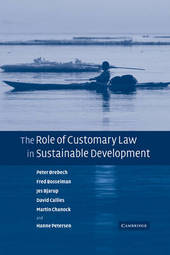
|
The Role of Customary Law in Sustainable Development
Paperback / softback
Main Details
| Title |
The Role of Customary Law in Sustainable Development
|
| Authors and Contributors |
By (author) Peter Orebech
|
|
By (author) Fred Bosselman
|
|
By (author) Jes Bjarup
|
|
By (author) David Callies
|
|
By (author) Martin Chanock
|
| Physical Properties |
| Format:Paperback / softback | | Pages:524 | | Dimensions(mm): Height 229,Width 152 |
|
| ISBN/Barcode |
9780521173421
|
| Classifications | Dewey:346.044 |
|---|
| Audience | | Professional & Vocational | |
|---|
| Illustrations |
Worked examples or Exercises
|
|
Publishing Details |
| Publisher |
Cambridge University Press
|
| Imprint |
Cambridge University Press
|
| Publication Date |
25 November 2010 |
| Publication Country |
United Kingdom
|
Description
For many nations, a key challenge is how to achieve sustainable development without a return to centralized planning. Using case studies from Greenland, Hawaii and northern Norway, this 2006 book examines whether 'bottom-up' systems such as customary law can play a critical role in achieving viable systems for managing natural resources. Customary law consists of underlying social norms that may become the acknowledged law of the land. The key to determining whether a custom constitutes customary law is whether the public acts as if the observance of the custom is legally obligated. While the use of customary law does not always produce sustainability, the study of customary methods of resource management can produce valuable insights into methods of managing resources in a sustainable way.
ReviewsReview of the hardback: 'The book is an insightful introduction to the topic, which will be of interest to academics and students in areas such as law, environmental studies, sociology and anthropology, as well as to development planners at the local, national and international level ... it fills a gap in the current literature regarding the difficult link between customary law and sustainable development which is all too often taken for granted.' Environmental Conservation
|